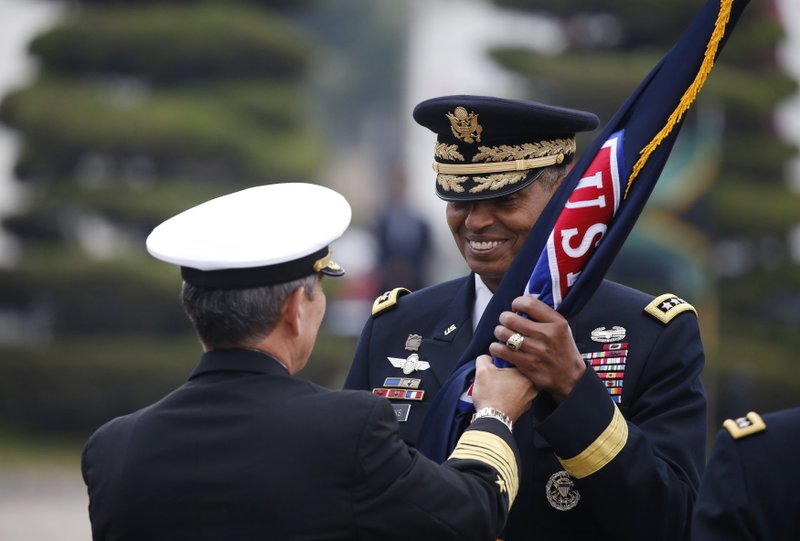SEOUL, South Korea -- The U.S.-led United Nations Command on Saturday dismissed as unsubstantiated accusations from North Korea that U.S. troops at a border village tried to provoke its front-line troops with "disgusting acts."
A North Korean military statement Friday warned U.S. soldiers to stop what it called "hooliganism" at the inter-Korean border village of Panmunjom or they'll meet a "dog's death any time and any place."
It said U.S. troops pointed their fingers at North Korean soldiers and made strange noises and unspecified "disgusting" facial expressions. It also said that U.S. troops encouraged South Korean soldiers to aim their guns at the North.
A statement from Christopher Bush, a spokesman for the U.N. command, said they looked into the allegations and determined they were unsubstantiated.
North Korea occasionally accuses South Korean and U.S. troops of trying to provoke its border troops and vice versa. After North Korea's first nuclear bomb test in 2006, the U.S. accused North Korean troops of spitting across the border's demarcation line, making throat-slashing hand gestures and flashing their middle fingers.
The latest North Korean accusation came a day after South Korean and U.S. officials said two suspected medium-range missile launches by North Korea ended in failure.
In recent weeks, North Korea fired a barrage of missiles and artillery shells into the sea in an apparent response to annual South Korea-U.S. military drills that ended Saturday.
About 28,000 U.S. troops are deployed in South Korea to deter potential aggression from North Korea, a legacy of the 1950-53 Korean War, which ended in an armistice and not a peace treaty.
Panmunjom, located inside the 2.5-mile-wide Demilitarized Zone that bisects the Korean Peninsula, is where the 1953 armistice was signed. It remains one of the world's most dangerous flash points, but Panmunjom -- jointly overseen by North Korea and the U.S.-led U.N. Command -- is also a popular tourist spot drawing visitors on both sides.
Visitors from the southern side are often told by tour guides to be extremely careful about what gestures they make so as not to antagonize the nearby North Korean soldiers.
Meanwhile, China's U.N. ambassador said a North Korea proposal under which Pyongyang would halt its nuclear program if the U.S. and South Korea suspend joint military exercises merits consideration.
"I think anything, anything, any proposal, no matter where the proposal comes from, so long it is conducive to a negotiated solution that will contribute to denuclearization to peace and stability on the Korean peninsula should be studied very carefully," Liu Jieyi said Friday.
He stressed the need for a multidimensional approach to the North Korea situation and said that sanctions and Security Council resolutions alone would not resolve the issue. He added countries could also work directly with North Koreans to defuse tensions.
Liu made his remarks during a news conference wrapping up his monthlong term as Security Council president.
Elsewhere, after years of wrangling with North Korea, Japan is appealing to the international community to help return Japanese citizens abducted several decades ago by North Korea.
Pyongyang agreed two years ago to reopen an investigation into the abductions of 12 people kidnapped to train North Korean spies. But Japan has been frustrated by North Korea's refusal to return or adequately explain what happened to the abductees, an issue that has bedeviled relations between the two countries for years.
After stalling for a year, North Korea angrily declared in February that it was stopping its investigation.
Katsunobu Kato, Japan's minister in charge of the abduction issue, will deliver an address in Washington this week and then at the U.N. to ask the international community to help "extract and induce" cooperation from North Korea's leader, Kim Jong Un.
"Our position is to strongly demand that the judgment is made [to resume discussions]," Kato said in an interview in his office, adorned with posters of the most famous abductee, Megumi Yokota, a 13-year-old who was taken on her way home from school in 1977.
During the 1970s and early 1980s, North Korea operated a state-sponsored abduction program in which it snatched young Japanese and put them on a boat to North Korea, where they were used to train spies to speak their language and pass for Japanese.
North Korea admitted to the abductions in 2002.
Information for this article was contributed by Hyung-Jin Kim and staff members of The Associated Press and by Anna Fifield of The Washington Post.
A Section on 05/01/2016

